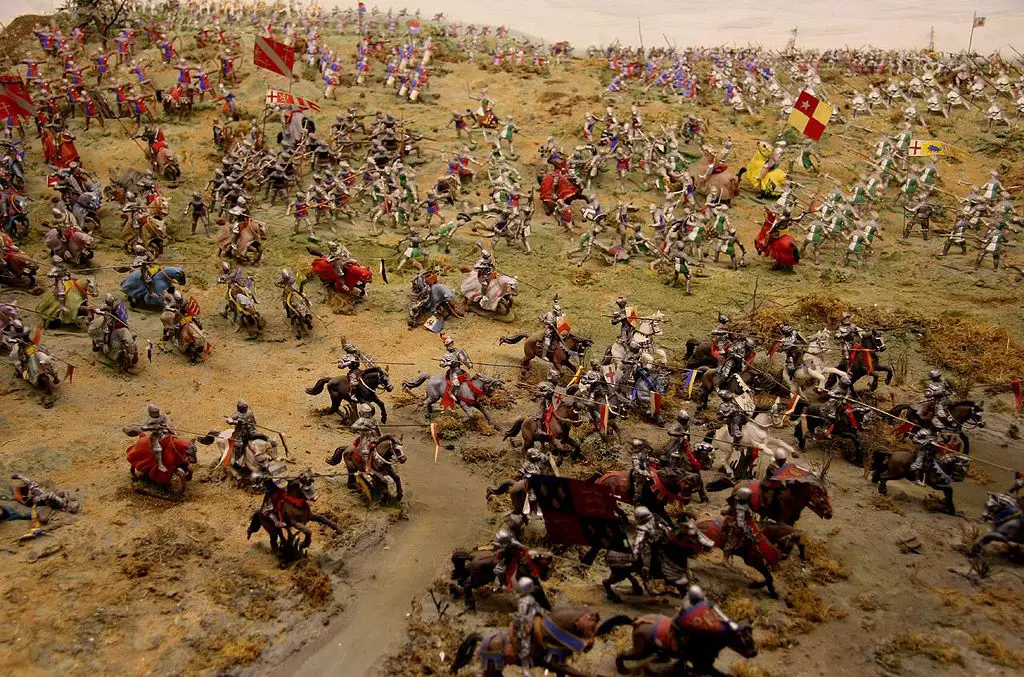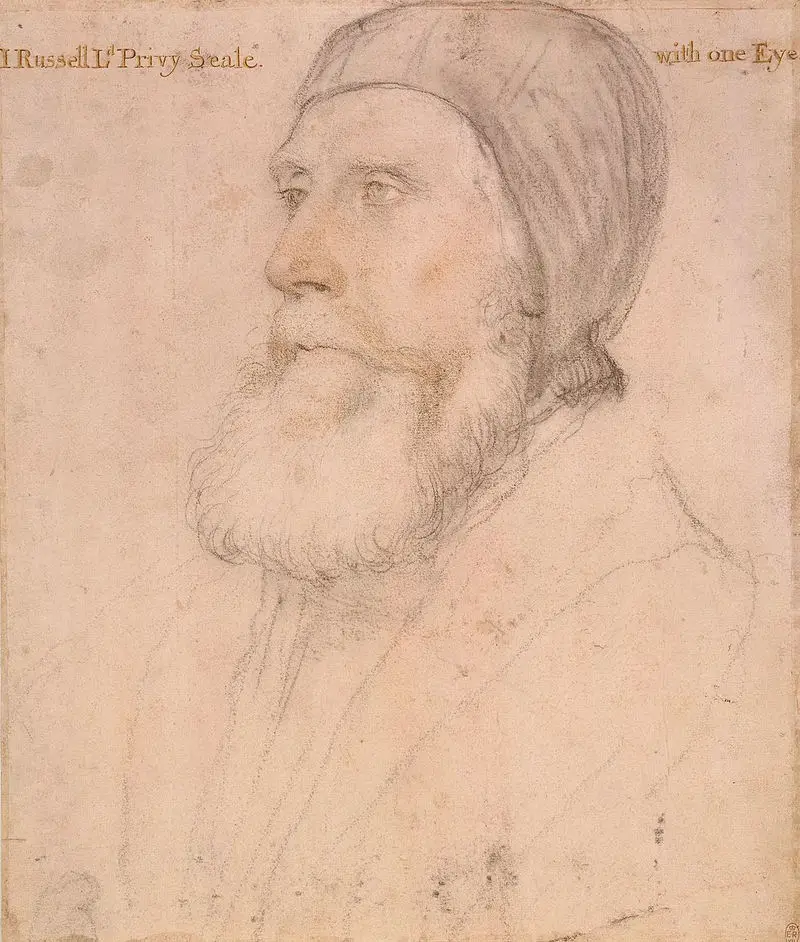10 August
1512 – The Battle of Saint-Mathieu between the English and Franco-Breton fleets off the coast of Brest. Henry VIII's largest ship, the Regent, sank as did the Breton ship the Marie La Cordelière.
1512 – Death of Sir Thomas Knyvet, courtier and Captain of the Regent. According to one report, he died before the ship sank, being killed by gunfire.
1518 – Death of Sir Robert Sheffield, lawyer and Speaker of the House of Commons. He was imprisoned in the Tower of London after making an enemy of Cardinal Wolsey, being accused of negligence as a Justice of the Peace and of harbouring a killer. It is not clear whether he was still in the Tower at his death, but he was buried in the nearby church of the Austin friars.
1520 – Birth of Madeleine de Valois, consort of James V of Scotland, at St Germain-en-Laye. She was the fourth child of Francis I of France and his wife, Queen Claude.
1532 – Birth of Thomas Jones, known as Twm Siôn Cati, the Welsh-language poet and genealogist. It is unclear whether he was born on Lammas Day (1st August) or St Lawrence's Day (10th August). Few of his poems have survived, and Welsh folklore has turned him into a 'Welsh Robin Hood'.
1534 - The friars observant were expelled from their houses due to their support of Catherine of Aragon and their refusal to accept the King's supremacy. Some were sent to houses of the Grey Friars where, according to Eustace Chapuys, the imperial ambassador, “they were locked up in chains and treated worse than they could be in prison”. Others were imprisoned in London and a few fled abroad.
1553 – Mary I held an obsequy or requiem mass for the soul of her late half-brother, Edward VI. While she allowed him to have a Protestant burial on the 8th August, she ordered three days of Catholic requiem masses for him.
1621 – Death of Grey Brydges, 5th Baron Chandos, courtier and magnate. He died in Spa, Belgium, where he had travelled for his health. He was buried in the family chapel at Sudeley.
11 August
1556 – Death of Sir John Kingsmill, politician and a man who had been close to Thomas Cromwell and Thomas Wriothesley. He served as Sheriff in the reign of Henry VIII and as a Commissioner for the Dissolution of Chantries in 1548 to Edward VI.
1575 – Death of Alexander Home, 5th Lord Home, in Friar Wynd, Scotland. Home was imprisoned after the 1573 fall of Edinburgh Castle and the garrison loyal to Mary, Queen of Scots.
1581 – Death of Sir Maurice Berkeley, Gentleman Usher of Henry VIII's Privy Chamber. Berkeley served Edward VI as a Gentleman of the Privy Chamber, and was the man who arrested the rebel Thomas Wyatt the Younger in Mary I's reign.
12 August
1557 – Death of Sir John Pollard, judge, Speaker of the House of Commons (1553 and 1555) and Second Justice of Chester. He was buried in London.
1560 - The translator, lawyer, physician and paediatrician Thomas Phaer made his will after suffering an accident which made his right hand completely useless. His date of death is unknown, but he died at his Cilgerran estate in Pembrokeshire, Wales, within weeks of his will being drawn up.
1570 – Death of Lady Ursula Stafford (née Pole), daughter of Margaret Pole, Countess of Salisbury, and wife of Henry Stafford, 10th Baron Stafford.
1573 – Death of nobleman and rebel Leonard Dacre from a fever while in exile in Brussels. He was buried in St Nicolas Church in the city. Dacre is known for his participation in the 1569 Rising of the North, a rebellion seeking to remove Elizabeth I and to replace her with Mary, Queen of Scots.
1577 – Death of Sir Thomas Smith, humanist scholar and diplomat, at Hill Hall in Essex. He was buried in St Michael's Church, Theydon Mount. Smith served Elizabeth I as Chancellor of the Order of the Garter and as Secretary of State, but is known for his political books “The Discourse of the Commonweal” and “De Republica Anglorum; the Manner of Government or Policie of the Realme of England”.
1596 – Burial of Henry Carey, 1st Baron Hunsdon, in Westminster Abbey at the expense of his cousin Elizabeth I.
13 August
1514 - Princess Mary Tudor, sister of Henry VIII, married King Louis XII by proxy at Greenwich Palace. Mary was present at the ceremony, but the Duke of Longueville stood in for the groom.
1566 – Death of Sir Humphrey Radcliffe, member of Parliament, at his manor of Elstow. He was buried in Elstow Church. Radcliffe served as a member of Parliament during the reigns of Mary I and Elizabeth I, and then as a JP and Sheriff in Elizabeth I's reign.
1568 – Death of William Barlow, Bishop of Chichester. He was buried in Chichester Cathedral.
1579 – Executions of Roman Catholic martyrs Friar Conn O'Rourke and Patrick O'Healy, Bishop of Mayo. They were hanged just outside Kilmallock, co. Limerick. O'Healy was tortured before his death, by having spikes driven through his hands, in the hope that he would give Sir William Drury, Lord President of Munster, details on James fitz Maurice Fitzgerald's plans to lead a Catholic crusade to Ireland. He would not talk. O'Healy was beatified in 1992.
14 August
1473 – Birth of Margaret Pole, Countess of Salisbury, the daughter of George, Duke of Clarence, brother of Edward IV, and his wife Isabel Neville. Margaret was born at Farley Castle, near Bath.
1479 – Date given as the birthdate of Katherine of York (Katherine, Countess of Devon), at Eltham Palace. Katherine was the daughter of Edward IV and Elizabeth Woodville, and she married Sir William Courtenay, the future Earl of Devon, in 1495.
1513 - William Parr, Marquis of Northampton and brother of Queen Catherine Parr, was born.
1539 – Death of Sir Peter Edgcumbe. Edgcumbe served as Sheriff of Devon and Cornwall at various times between 1494 and 1534, was at the 1513 Battle of the Spurs and was present at the Field of Cloth of Gold in 1520.
1620 – Burial of Katherine Hastings (née Dudley), Countess of Huntingdon, in Chelsea Old Church. Katherine was the daughter of John Dudley, Duke of Northumberland, and his wife Jane, and was married to Henry Hastings, 3rd Earl of Huntingdon. Katherine was buried in her mother's tomb.
15 August
1544 – Birth of Sir Peter Young, Scottish diplomat and tutor to the young James VI of Scotland, at Dundee.
1551 – Robert Dudley, the future Earl of Leicester, and his friend Barnaby Fitzpatrick, 2nd Baron Upper Ossory, were appointed as Gentlemen of Edward VI's Privy Chamber.
1552 – Death of Sir Anthony Wingfield, soldier and administrator, in Bethnal Green. He was buried at Stepney. Henry VIII named Wingfield as an Assistant Counsellor of his will and Wingfield served Henry's son, Edward VI, as Vice-Chamberlain of the Household, Comptroller of the Household and Exchequer Chamberlain.
1563 – Death of Thomas Argall, administrator in the reigns of Henry VIII, Edward VI, Mary I and Elizabeth I, at his house in Ivy Lane, London. He was buried in St Faith's under St Paul's. Argall is described by his biographer J.D. Alsop as being “one of the most prominent royal administrators of clerical revenue and accounts” between 1540 and his death in 1563.
1588 - Catholics Robert Wilcox, Edward Campion, Christopher Buxton and Robert Widmerpool were examined. Campion, Wilcox and Buxton were found guilty of being Roman Catholic priests and Widmerpole was charged with giving aid to a priest. They were executed by being hanged, drawn and quartered at Oaten Hill in Canterbury on 1st October 1588.
1594 – Burial of Thomas Kyd, playwright, at St Mary Colechurch in London. Kyd is known for his play “The Spanish Tragedy” (c1537), and some scholars believe that he wrote a “Hamlet” play before that of William Shakespeare.
1603 – Burial of Lady Mary Scudamore (née Shelton), a member of Elizabeth I's Privy Chamber and one of her favourite sleeping companions, at Home Lacy in Herefordshire. In 1584, Mary, Queen of Scots, accused Elizabeth I of breaking one of Mary Scudamore's fingers in a fit of temper after finding out about Mary's marriage to Sir John Scudamore.
1610 – Death of Peter Lowe, surgeon and founder of the Royal College of Physicians and Surgeons of Glasgow, as it is now known, in Glasgow. He was buried at Glasgow Cathedral.
1612 – Death of administrator Sir Michael Hickes at Ruckholt in Essex from a “burning ague”. He was buried at Leyton Church in Essex. Hickes served William Cecil, Lord Burghley, as one of his principal secretaries and was close friends with Burghley's son, Robert Cecil.
16 August
1513 - The Battle of Spurs took place at Guinegate (Enguinegatte) in France. It was a battle between the English, backed by Imperial troops, and the French, and is called the Battle of the Spurs because the French knights, taken by surprise and realising that they were outnumbered and outmanoeuvred, fled on horseback, their spurs glinting in the sunlight.
1533 (16th or 17th August) – Death of Thomas Skevington, Abbot of Beaulieu and Bishop of Bangor, at Beaulieu. His body was buried at Beaulieu and his heart buried on the north wall of Bangor Cathedral, before the picture of St Deiniol.
1549 – Death of Sir Christopher More, landowner and administrator. He was buried in St Nicholas's Church, Guildford, in the Loseley Chapel. More was a JP and Sheriff during the reign of Henry VIII and was appointed, in 1539, to the guard of honour prepared for Anne of Cleves in late 1539.






Am I permitted to print content from my computer for my own use? I didn’t see a print command noted. Also, does the society include book reviews of British dynastic non-fiction (OR well-done historical fiction) on this site? I have just read THE QUEEN’S BED, by Anna Whitelock, and I’m curious about what other members might have thought about it.
Hi MaryJane,
Yes, you may print out any content you like from the site for your own use. Sometimes only paper will do!
There is a section in the forum for discussions about books. I would suggest that you start some discussions there:
https://www.tudorsociety.com/forum/movies-and-books/
Tim.